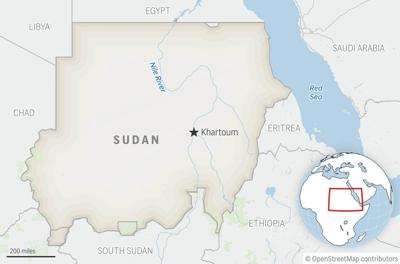CAIRO (AP) ŌĆö SudanŌĆÖs paramilitary unleashed drones on the Red Sea city of Port Sudan early Tuesday, hitting key targets there, including the airport, the port and a hotel, military officials said. The barrage was the second such attack this week on a city that had been a hub for people fleeing Sudan’s two-year war.
There was no immediate word on casualties or the extent of damage. Local media reported loud sounds of explosions and fires at the port and the airport. Footage circulating online showed thick smoke rising over the area.
The attack on Port Sudan, which also serves as an interim seat for Sudan’s military-allied government, underscores that after two years of fighting, the military and the paramilitary Rapid Support Forces are still capable of threatening each otherŌĆÖs territory.
The RSF drones struck early in the morning, said two Sudanese military officials, speaking on condition of anonymity because they were not authorized to talk to the media.
Information Minister Khalid Aleiser visited the southern part of the port, where he said fuel tanks were hit in the attack. He slammed the United Arab Emirates, saying it was arming the paramilitary RSF.
ŌĆ£We will continue our legitimate battle,ŌĆØ he said as flames and thick smoke billowed behind him.
The UAE rejected the accusation and condemned the attacks. In comments to The Associated Press, the country’s Foreign Ministry on the Sudanese government ŌĆ£to de-escalate, disengage and negotiate” to end the war.
Abdel-Rahman al-Nour, a Port Sudan resident, said he woke up to strong explosions and saw fires and plumes of black smoke rising over the port. MshaŌĆÖashir Ahmed, a local journalist living in Port Sudan, said fires were still burning late Tuesday morning in the southern vicinity of the maritime port.
The attack apparently disrupted air traffic at the airport, with Cairo airport data in neighboring Egypt showing that three Port Sudan-bound flights were canceled on Tuesday.
Satellite images from Planet Labs PBC taken Tuesday show several fuel tanks ablaze about 6 kilometers (3.7 miles) southeast of downtown Port Sudan, on a farm identified as belonging to the state-owned Sudan National Petroleum Corp. Thick black smoke is seen rising into the sky.
This was not the first time the oil industry was targeted. In January, fighting around SudanŌĆÖs largest oil refinery set it ablaze as SudanŌĆÖs military ultimately pushed the RSF from the site north of the capital, Khartoum.
The RSF did not release any statements on the attack. On Sunday, the paramilitary force struck Port Sudan for the first time in the war, briefly disrupting air traffic in the cityŌĆÖs airport, which has been the main entry point for the country in the last two years.
A military ammunition warehouse in the Othman Daqna airbase in the city was also hit, setting off a fire that burned for two days.
Clementine Nkweta-Salami, the U.N. humanitarian coordinator in Sudan, expressed concerns Tuesday about the attacks on Port Sudan civilian infrastructure, calling them ŌĆ£serious violations of international humanitarian law.ŌĆØ
ŌĆ£Such attacks will deepen humanitarian suffering and needs, as well as exacerbate the already severe access and logistical challenges,ŌĆØ she said in a statement.
When the fighting in Sudan broke out, the focus of the battles initially was in Khartoum, which turned into a war zone. Within weeks, Port Sudan, about 800 kilometers (500 miles) to the east of Khartoum, turned into a safe haven for the displaced and those fleeing the war. Many aid missions and U.N. agencies moved their offices there.
The attacks on Port Sudan are also seen as retaliation after the Sudanese military earlier this month struck the Nyala airport in South Darfur, which the paramilitary RSF has turned into a base and where it gets shipments of arms, including drones.
A said in 2024 that cargo planes carrying weapons, ammunition and medical support to the RSF flew from the UAE’s capital, Abu Dhabi. The UAE denies the claim. Sudan’s military is backed by Egypt.
Sudan plunged into chaos in April 2023, when simmering tensions between the military and the RSF exploded into open warfare in Khartoum. From there, the fighting spread to other parts of the country.
Since then, at least 24,000 people have been killed, though the number is likely far higher. The war has driven about 13 million people from their homes, including four million who crossed into neighboring countries. It also pushed parts of the country into famine.
The fighting has been marked by atrocities including mass rape and ethnically motivated killings that amount to war crimes and crimes against humanity, especially in the western Darfur region, according to the United Nations and international rights groups.
___
Associated Press writer Jon Gambrel in Dubai, United Arab Emirates, contributed to this report.


























